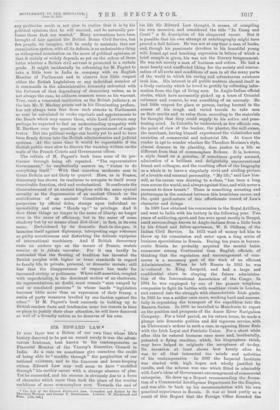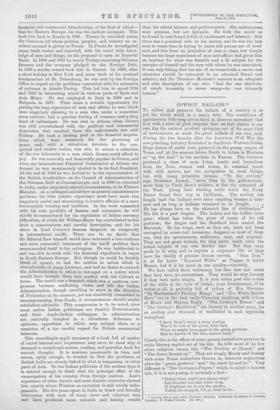SIR EDWARD LAW.* IF ever there was a Briton of
our own time whom; life's history deserved to be put on record surely it was the adven- turous Irishman, best known to his contemporaries as Financial Member of the Viceroy's Executive Council in India. As a race we sometimes give ourselves the credit of being able to "muddle through" the perplexities of our national existence, and to the timorous and home-keeping citizen Edward Law may well seem to have "muddled through" his earthly career with a strange absence of plan. Yet he succeeded, and his success is obviously due to a force of character which more than took the place of the routine ambitious of more commonplace men. Towards the end of
• '1'ha Lifo of Sir Edward, FikrGoraid Law. Compiled and Edited by Sir Theodore Morison and George T. Hutehinson. London : W. I3lackwood and Sous. [15a net.] his life Sir Edward Law thought, it seems, of compiling his own memoirs, and considered the title "In Camp and Court" a fit description of his chequered career. But it is possible that his own attempt at autobiography might have proved a dull failure. He-was net at any time a man of books, and, though his passionate devotion to his beautiful young wife found apt and touching expression in letters of which a brief sample is given, his was not the literary temperament. He was not merely a man of business and action. He had a most hearty and unaffected liking for the society and conver- sation of all sorts and conditions of men in all the many parts of the world to which his roving and adventurous existence took him. His interest in all public matters showed itself in a lively curiosity which he loved to gratify by collecting infor- =Ilion. from the lips of living men. In Anglo-Indian official circles, which have necessarily picked up a trace of Oriental reticence and reserve, he was something of an anomaly. He had little respect for place or person, having learned in the course of his rough and varied travels to take men on their merits and to value them according to the materials for thought that they could supply to his active and pene- trating mind. In Calcutta be understood, as few officials can, the point of view of the banker, the planter, the mill owner, the merchant, having himself experienced the vicissitudes and anxieties of commercial and industrial life. At times the reader is apt to wonder whether Sir Theodore Morison's style, almost demure in its placidity, does justice to a life so different from that of commonplace Britons. It is, however, a style based on a genuine, if sometimes gently amused, admiration of a brilliant and delightfully unconventional friend and colleague, and the resulting effect of the biography as a whole is to leave a singularly vivid and abiding picture of a lovable and unusual personality. "My life," said Law him- self, as his career was drawing to a close, "has been a long race across the world, and always against time, and with never a moment to draw breath." There is something arresting and picturesque in the contrast between this breathless career, and the quiet good-nature of this affectionate record of Law's character and doings.
In 1868 Law obtained his commission in the Royal Artillery, and went to India with his battery in the following year. Two years of soldiering, sport, and fun were spent mostly in Bengal, amid surroundings known to Anglo-Indians from a little book by his friend and fellow-sportsman, W. B. Oldham, of the Indian Civil Service. In 1872 want of money led him to throw up his commission and enter upon a long series of business speculations in Russia. During ten years in bureau- cratic Russia he probably acquired the mental habit. commoner among Continental than English officials, of thinking that the regulation and encouragement of com- merce is a necessary part of the work of an efficient Administration. When he left Russia in 1883 he was in`roduced to King Leopold, and had a large and confidential share in shaping the future administra- tion of the International Association of the Congo. In 1884 he was employed by one of the pioneer telephone companies to fight its battles with wealthier rivals in London, and entered into the struggle with characteristic Irish gusto. In 1885 he was a soldier once more, working hard and success- fully in organizing the transport of the expedition into the Eastern Sudan, In 1886 he travelled to Manchuria to report on the position and prospects of the Amur River Navigation Company. For a brief period, on his return home, he made a plunge into domestic polities and did vigorous service, with an Ulsterman's ardour in such a case, in opposing Homo Rule with the Irish Loyal and Patriotic Union. For a short while after this he entered business once more and, incidentally, patented a flying machine, which, his biographers think, may have helped to originate the aeroplanes of to-day. Its invention at least shows how keenly alive he was to all that interested the minds and activities of his contemporaries. In 1887 the Imperial Institute was started with high hopes not wholly justified by results, and the scheme was ono which fitted in admirably with Law's ideas of Government encouragement of commercial enterprise. He drew up a Report recommending the forma- tion of a Commercial Intelligence Department for the Empire, and was able to back up hi a recommendation with his own practical experiences in Russia. It was at least partly as a result of this Report that the Foreign Office founded the
financial and commercial Attacheships, of the first of which— that for Eastern Europe—he was the earliest occupant. This took him back to Russia in 1888. Thence he travelled across the Caucasus (of whose politics, peoples, and scenery an ex- cellent account is given) to Persia. In Persia be investigated many trade routes, and reported, with his usual wide know- ledge of men and things, on the proposal to open an Imperial Bank. In 1800 and 1891 be was in Turkey examining Ottoman finances and the revenues pledged to the Foreign Debt. In 1892 a similar errand took him to Greece. In 1893, after a short holiday in New York and some work at his nominal headquarters at St. Petersburg, he was sent by the Foreign Office to report on the problems connected with the extension of railways in Asiatic Turkey. This led him to spend 1894 and 1895 in interesting travel in various parts of Syria and Asia Minor. He was employed in Italy in 1896 and in Bulgaria in 1897. Then came a notable opportunity for putting his long experience of men and affairs to uses which were singularly pleasing to a man who, under a somewhat stern exterior, had a genuine feeling of romance and a deep fund of enthusiasm. He was sent to Athens when Greece was still overwhelmed with the political and commercial depression that resulted from the unfortunate war with Turkey. He took a leading part in the financial negotia- tions which were necessary for the procuring of peace, and, with a chivalrous devotion to the con- quered and -weaker nation, was able to secure a reduction of the war indemnity to a sum which Greece could afford to ,pay. He was naturally and deservedly popular in Greece, and when the International Financial Commission at Athens was formed he was unanimously elected to be its first President. At the end of 1898 he was invited to be the representative of the British bondholders on the Council of Administration of the Ottoman Debt at Constantinople, and in 1899 he returned to India, under singularly altered circumstances, to be Finance Minister. As a colleague and adviser on general administrative problems his wide Asiatic experience must have made him singularly useful and stimulating to brother officials of a more bureaucratic training and tradition. In the work connected with his own portfolio of finance and commerce he will chiefly be remembered for his regulation of Indian currency difficulties, of which Sir William Meyer has contributed to this book a conscientious and careful description, and for his share in Lord amon's famous despatch on reciprocity in international tariffs. There can be no doubt that Sir Edward Law himself would have welcomed a less cautious and more autocratic treatment of the tariff problem than recommended itself to his colleagues. He was habituated to and was able to work with the financial apedients in vogue in South-Eastern Europe. But though he could be frankly blunt of speech, he had the caution in action which is characteristic of many Irishmen, and had no desire to embark the Administration to which he belonged on a policy which would have brought them into conflict with the Cabinet at home. The result was a despatch which was a cautious com- promise between conflicting views, and left the Indian Administration, though unwilling to move in the direction
of Protection at the moment, yet not absolutely committed to uncompromising Free Trade, if circumstances should render retaliation advisable. This compromise is to be noted, since most native Indian politicians are frankly Protectionists, and. their Anglo-Indian colleagues in administration are naturally tempted to a chivalrous deference to opinions, opposition to which may subject them to a suspicion of a too careful regard for British commercial interests.
This exceedingly rapid summary of a book full of matter of varied interest and importance may serve to show why it demands a second and serious reading, and provides food for earnest thought. It is nowhere pessimistic in tone, and serves, aptly enough, to remind us that the problems of British India are closely linked to what is happening in other parts of Asia. To the Indian politician of the modern type it is natural enough to think that his principal affair is the emancipation of his country from foreign control. Law's experience of other Asiatic and semi-Asiatic countries showed him exactly where Western co-operation is still wholly indis- pensable. His five years spent in India in frank and friendly intercourse with men of many races and religions may well have produced more valuable and lasting results than his official labours and performances. His enthusiasms were genuine, but not Quixotic. He took the world as he found it, and found it full of excitement and interest. But there was a practical side to his nature, and he was the last man to waste time in trying to make silk purses out of sows' ears, and this from no prejudice of race or class, but simply because his large experience of men and affairs had given him an instinct for what was feasible and a fit subject for the energies of himself and the men with whom he was associated. It was only fitting that the tale of so remarkable a career and character should be entrusted to an attached friend and. admirer, and Sir Theodore Morison's account is an adequate and able description of one who "had the one attribute of which humanity is never weary—he was intensely human."























































 Previous page
Previous page